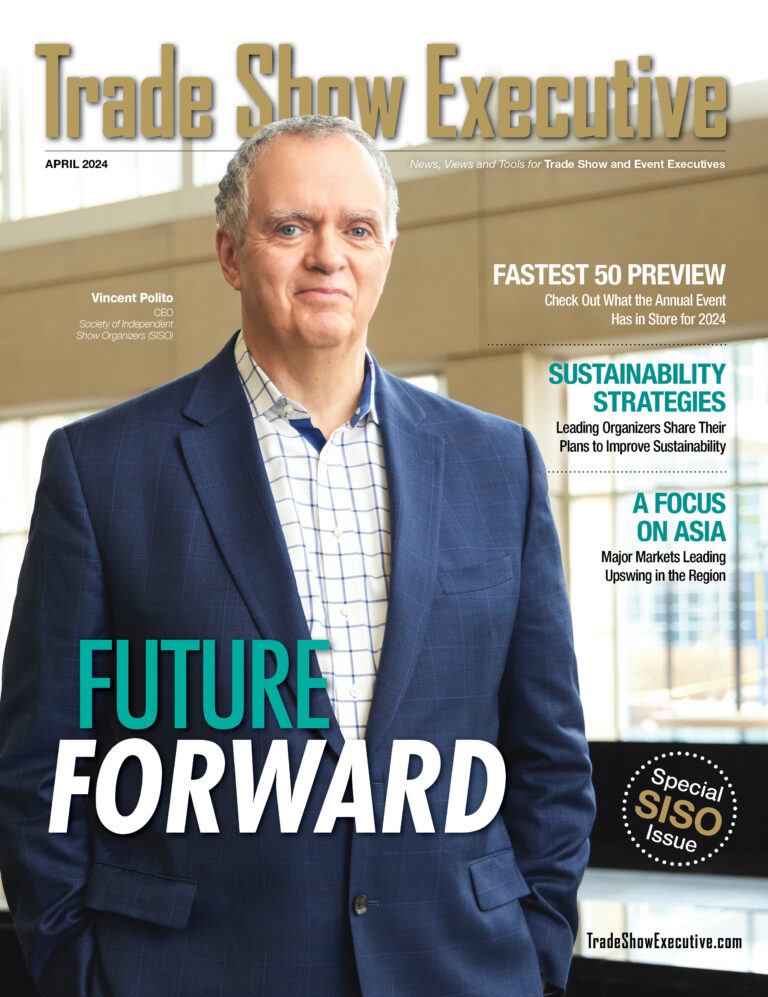Washington, DC – Gary Shapiro, president and CEO of the Consumer Electronics Association, has released his second book on winning the business battles of the 21st Century and it quickly reached the No. 3 rank on the New York Times Best Sellers list.
Ninja Innovation, The Ten Killer Strategies of the World’s Most Successful Businesses, is illustrated by briefcase-wielding ninja warrior, symbolizing the glorious victories that can be gained by companies that are swift, agile and deadly in their strategic executions.
This is Shapiro’s second book to debut on the New York Times Best Sellers list. The Comeback: How Innovation Will Restore the American Dream, debuted at No. 7 in January 2011.
Shapiro sat down recently to discuss Ninja Innovation with Bob James, guest contributor and vice president of ITN, a company which is a pioneer in the use of short-range wireless communications for the events industry.
Every Business is Engaged in Battle
Trade show executives don’t often write a best-seller, much less two. But that’s just what Gary Shapiro, president and CEO of the Consumer Electronics Association, has done. Shapiro’s new book, Ninja Innovation, comes two years on the heels of his first one, The Comeback. Guest Contributor Bob James asked him to provide a little insight about the new book.
James: Ninjas are combatants. Do you think business is really a form of war?
Shapiro: Every business is engaged in battle. It’s the battle to rise from survival to prosperity. So you have to have a battle plan and a goal; you have to marshal your forces; you have to be strategic; and you have to recognize that your competition is doing the same things. The truth is that if you’re a business leader and you fail, there are real-life consequences. It’s not just about you. It’s about your employees, their jobs and their lives. So, if you’re a leader in business, you have to take it seriously and be creative and realize a lot is on the line. At the same time, it doesn’t mean, if you fail, it’s a bad thing. You have to learn from failure, which will make you better the next time.
James: You talk in the book about “mental toughness.” Do you have to be a bully or a drill sergeant to be successful?
Shapiro: Absolutely not! That’s a recipe for not being successful. You need to think like a ninja to succeed. You have to be clever and think outside the box. You have to set a goal and relentlessly pursue it. You have to be focused. Mental toughness to me is an approach to life—it’s not just about business. It’s about how you approach life, what you’re trying to do, and how you’re getting there. As they say, if you don’t know where you’re going, that’s where you’ll end up. At the same time, there’s another old saying: “Men plan and God laughs.” Life throws you curve balls and you’ve got to deal with them. You’ve got to adjust all the time. And it’s the same in business. You have to be flexible, roll with the punches, use the resources at your disposal, and think like a ninja.
James: Do you ever despair about the Millennials’ ability to be ninja-like?
Shapiro: I don’t think it’s an age-related phenomenon. There are plenty of tough ninjas that are young. But, as I say in the book, you have a lot less to risk when you’re younger. Older people, although they have more wisdom and experience, sometimes get used to comfort. They have family obligations, mortgages and car payments, and are less likely to take risks and be a ninja. They spend a lot of time trying to preserve what they have. So, on the one hand, I think youth lack wisdom; but they also lack the artificial borders and barriers that might preclude new ventures.
James: Why does your trade show, the International CES, deserve the title “ninja trade show?”
Shapiro: We have succeeded in part by continually redefining ourselves. Our whole strategy has been to expand the definition of what the show includes. Internationalizing the show and including the automotive, content, and health and fitness industries has allowed us to grow to over 1.9 million net square feet. And we’re paranoid. We want to make sure we never become complacent. We’re also very self-critical and always say, “What can we do to make the show better?” But it’s not just that we’ve been smart—we’ve been lucky, as well. We’ve made mistakes, although none have been fatal. To me, a ninja is someone who’s incredibly flexible and uses whatever she can to do things better. We don’t have every answer, but we’re smart enough to seek answers from others. We go to a lot of other shows, just to see what others are doing. That’s what great trade show producers do. They’re always learning from their colleagues. That’s why I think we’re a ninja trade show.
James: What ninja ways can an exhibitor bring to exhibit marketing?
Shapiro: Sometimes I fantasize about being an exhibitor. The first thing I’d do is talk to the trade show producer and make sure they understand my goals and learn how my goals fit with the trade show’s goals. And I’d brainstorm. Not everything has to cost money—it could be that I could speak at the conference or have a press conference at the show; or I could have an event which adds excitement to the show. Exhibitors that are savvy spend time with the show producer exploring what things can be done together to support their mutual goals. The worst thing an exhibitor can do is just show up. We love it when our exhibitors want to explore different things. We sign nondisclosure agreements; we brainstorm; we suggest things; they suggest things. Not everything is doable obviously, but if it meets our need for excitement, attendance, announcements, promotion, star-power, stretching the envelope, making news, then we are happy to help. Exhibitors have to understand it’s not just about raw exhibit space and building a pretty booth. It’s about being creative. You can always tell the savvy companies from the less than savvy ones. The savvy companies rarely have a bad experience at our show.
Reach Gary Shapiro at (703) 907-7610 or gshapiro@CE.org; Bob James at (801) 676-7940 or bjames@itn-international.com











